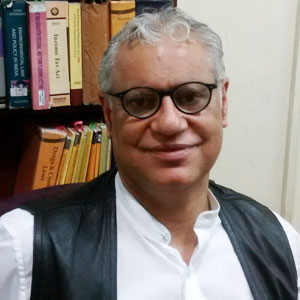
Anand Grover, is a designated Senior Advocate, practicing in the Supreme Court of India and the Director of the Lawyer’s Collective (India), having offices in Mumbai, Delhi and Bangalore. He was the UN Special Rapporteur on the right of everyone to the enjoyment of the highest attainable standard of physical and mental health (Right to Health) by the UN Human Rights Council from 1 August 2008 to 31 July 2014.
Anand Grover is a well-known long-time advocate and activist on HIV, health and human rights.
He has argued many cases relating to the rights of people living with HIV, including the first HIV case in India relating to employment law, on sexual diversity, including the case which decriminalized same sex in the Delhi High Court, and the Supreme Court, (the Naz Foundation case) now pending decision in the curative petition, (the NALSA case relating to recognition of transgender identity), cases relating to women in respect of employment, sexual harassment at the workplace etc., patent cases to make medicines accessible in India, and the developing countries, including the Novartis (relating to patentability criteria and the cancer drug Gleevec) and the Natco case (relating to compulsory license of the cancer drug, Nexavar) cases relating rights of sex workers and persons who use drugs, on tobacco use and information relating to the same, cases relating to drug use, including death penalty issues (Indian Harm Reduction Network case).
He has recently been nominated as the Special Public Prosecutor by the Supreme Court of India and then so appointed to conduct the prosecution in the 2G case, one of the biggest anti-corruption cases in India.
He has spoken and at the national, regional international conferences. He presented the Jonathan Memorial Lecture at the Toronto conference on HIV and AIDS.
Mr. Grover has worked closely with UNAIDS on HIV-related rights and law issues for many years and has been a valuable resource for it. In this regard, he has served on the UNAIDS Reference Group on HIV and Human Rights which advises UNAIDS Executive Director, Michele Sidibe, on how it can strengthen the commitment and capacity of governments, civil society and the private sector to protect and promote human rights in relation to HIV. At the request of the Government of India, Anand Grover and the Lawyers Collective drafted the HIV Bill, which is pending with the Government.
He was the member of the drafting group of the International Guidelines on Human Rights & HIV/AIDS and a member, National Board, AVAHAN, the India AIDS Initiative, Gates Foundation, Board Member of International AIDS Vaccine Initiative, the Reference Group on Human Rights to the Executive Director, UNAIDS, National Advisory a member of the World Care Council, a member of the Core Group of NGOs representatives in the National Human Rights Commission of India and the member of the National Advisory Board on HIV and AIDS set up the Prime Minister of India.
He is presently member of Global Commission on Drug Policy, the member the Lancet-University of Oslo Panel on Global Governance on Health and the member of the Equitable Access Initiative.
In August 2008, Mr. Grover took over from Paul Hunt, as the UN Special Rapporteur on the Right to Health for a period of six years. He has submitted eleven reports to the UN Human Rights Council (HRC) and the UN General Assembly on i) TRIPS, Patents, FTAs and the Right to Health; ii) Informed Consent and the Right to Health, iii) Criminalization of HIV transmission, same sex relations and sex work and the Right to Health iv) Criminalization of Drug use and the Right to Health; v) Development and Right to Health; vi) Elderly Persons and the Right to Health; vii) Right to Sexual and Reproductive Health and Criminalization; viii) Access to Medicines and the Right to Health; ix) Occupation Health; x) Health Financing and xi) Migration and Health; xii) Conflict and Health; xiii) Promotion of Unhealthy food and health and xiv) Evaluating the Right to Health. He has also undertaken nine countries missions, to Poland, Australia, Guatemala, Syria, Ghana, Vietnam, Azerbaijan, Tajikistan and Japan and submitted reports of his missions to the HRC.
